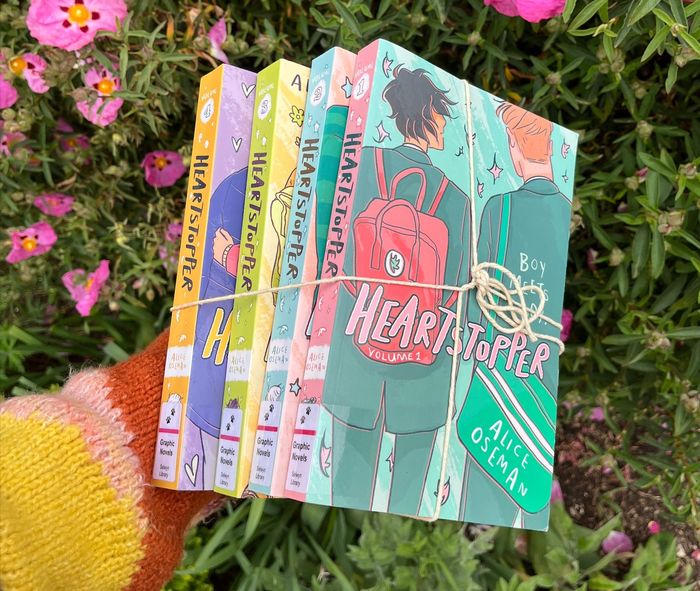Conversations with Friends: Frances’ reading list
Anna Piper-Thompson argues that a closer look at the series’ literary references reveals a fascinating web of intertextuality

For the many lovers of Normal People (2020), the new Rooney-to-series adaptation Conversations with Friends (2022) was eagerly anticipated. Intertextuality is key to both Rooney’s books and their screen adaptations. The way she interlocks her stories and characters with literature gives us keys to understanding them in more depth. The importance of intertextuality to the series is stressed in the opening scene, where Bobbi recites a riddle from Frances’ poem: ‘I am inherently worthless but highly prized. I will empty out your bank account. I’m all about love. But I have a heart of stone and have been known to prefer to be owned’. Their performance of this poem is also what thrusts our characters into the whirlwind of their interwoven romances, as they meet Melissa at this show.
Like Connell in Normal People and Sally Rooney herself, Frances is also an English student, as well as a spoken word poet. Literature is key to her character, and the books she is shown with can help us understand her more deeply, and gain insight into how she relates to the characters around her.
The reading list:
Cat on a Hot Tin Roof, Tennessee Williams (Episode 1)
In the first conversation between Nick and Frances they discuss Nick’s current job as an actor in this play, which he calls a “melodrama”, and “not a bold choice”, and Frances mentions that she “read it a long time ago”. Two major themes in this work are sexual desire and repression, something that is key to this scene as well, as we find out later that this conversation was the starting point of Nick and Frances’ desire for each other — a desire which ultimately pushed against the limitations of the marriage between Nick and Melissa.
Childhood, Tove Ditlevsen (Episode 4)
Frances reads this while on holiday, and another character jokingly remarks about it being “light summer reading”. The scene where we see Frances reading this on the beach as a whole juxtaposes her more reserved demeanour with the care-free nature of Bobbi, who we see swimming in the sea. The book itself is the first in a series of memoirs about Ditlevsen’s experience growing up in Denmark, how she left behind her childhood town and developed her writing. Throughout the series there is a disconnect between the Frances we see in Dublin and the one we see when she visits her childhood home. There are also several debates in the series about authorship, and about what it means to write in different forms or to be published — it is particularly a point of tension between Frances and Melissa.
Asymmetry, Lisa Halliday (Episode 6)
This book is visible during a scene where Frances argues with Bobbi about her secret relationship with Nick. This novel is about a publishing employee and their relationship with an ageing celebrity — ah, art imitating life...or in this case, mirroring it.
Citizen, Claudia Rankine (Episode 7)
A collection of poetry and lyric essays examining race in the U.S. We see this while Frances is in a seminar at Trinity College (so much for me watching this show to avoid thinking about my degree). Frances is also a spoken word poet, so it makes sense that we see her reading poetry most often.
The Seven Ages, Louise Glück (Episode 7)
A contemporary poetry collection which works as a collective to confront the poet’s own mortality. This book links all the characters together, much as their relationships entangle them; Bobbi gifted an edition to Frances, Frances goes to buy Nick a copy but then bumps into Mellissa at the bookstore, and they end up discussing it.
The Major Works, Robert Browning (Episode 12)
We see this book laid aside on a train table as Frances travels away from Dublin, mirroring her movement away from her relationship with Nick, which is emphasised by her pining-fuelled scrolling through images of them on her phone. Thematically, this book matches Frances and her predicament well, as many of Browning’s works are focused on his courtship with fellow poet Elizabeth Barrett, and the difficulties of fighting for their love against external disapproval, leading them to conduct much of their courtship in secret.
Glossary of the Irish literary scene:
The Stinging Fly
An Irish Literary Magazine, where Frances’ short story is published (her first publication). Sally Rooney has also been published in this magazine.
Hodges Figgis
A popular Dublin bookshop, where we see Frances shop in the ‘New Fiction Releases’ section. We also see her shopping in Waterstones (classic) in Episode 7 where she picks up The Seven Ages.
 Comment / Cambridge’s tourism risks commodifying students18 April 2025
Comment / Cambridge’s tourism risks commodifying students18 April 2025 News / Cambridge researchers build tool to predict cancer treatment success19 April 2025
News / Cambridge researchers build tool to predict cancer treatment success19 April 2025 News / Varsity ChatGPT survey17 April 2025
News / Varsity ChatGPT survey17 April 2025 News / Cambridge researchers find ‘strongest evidence yet’ of life on distant exoplanet18 April 2025
News / Cambridge researchers find ‘strongest evidence yet’ of life on distant exoplanet18 April 2025 News / Greenwich House occupiers miss deadline to respond to University legal action15 April 2025
News / Greenwich House occupiers miss deadline to respond to University legal action15 April 2025






